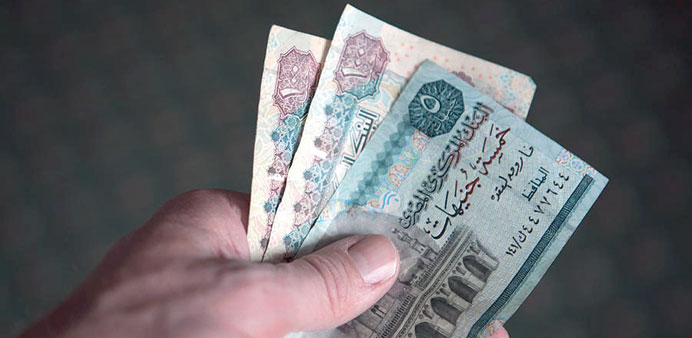Egypt is struggling with the worst economic slump in two decades and facing the Middle East’s biggest budget deficit as a percentage of economic output. Egypt has about 169bn pounds ($24bn) of local-currency debt repayments this quarter, a record, according to data compiled by Bloomberg
Bloomberg /Dubai
Egypt, which is witnessing violent clashes between supporters of deposed President Mohamed Mursi and the military, raised $1bn from a bond sale to Qatar, according to Exotix Holdings.
The Arab country, whose president was ousted by the army on July 3, a year into his term, sold the three-year notes on July 1 at a coupon of 3.5%, according to a term sheet received by Bloomberg late on Sunday.
Egypt’s former Finance Minister Fayad Abdel Moneim said by phone on June 4 the nation planned to issue $3bn of bonds to Qatar. The bonds will be issued in July, with a maturity of as many as three years and pay a 3.5% coupon, Al Mal newspaper reported that day, citing the Egyptian government. The country’s foreign exchange reserves fell by $1.1bn to $14.9bn in June, according to central bank data.
“This bond was probably issued to Qatar National Bank to channel the money that came from Qatar in June,” Gabriel Sterne, a London-based economist at Exotix Holdings Ltd, said in an e-mail yesterday. “It’s of great short-term significance, but possibly of questionable long-term significance because it contributes to procrastination over the fiscal adjustment.”
HSBC Holdings and QNB, the country’s biggest bank, managed the debt issue. The yield on Egypt’s 5.75% bonds due April 2020 gained 26 basis points to 9.33% yesterday.
Egypt is struggling with the worst economic slump in two decades and facing the Middle East’s biggest budget deficit as a percentage of economic output. Egypt has about 169bn pounds ($24bn) of local-currency debt repayments this quarter, a record, according to data compiled by Bloomberg. Political bickering since Mursi was elected has prolonged talks with the International Monetary Fund for a $4.8bn loan.
Domestic and external economic imbalances are severe and haven’t been tackled, Sterne wrote in a report to clients on July 4. Structural financing gaps have been filled by generous neighbours, and the economic crisis would be worse if that aid was switched off than if it had never arrived, he said.
“Fiscal adjustment isn’t at the forefront of anybody’s mind at the moment although they can’t just keep relying on one-off loans to fill the deficit,” Sterne said by phone yesterday.
The flaring violence in Egypt threatens to deepen political polarisation and derail efforts by the country’s interim leaders to form a government. Page: 40

